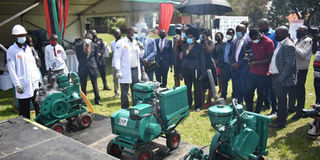Prime
Makerere unveils locally-made diesel engine

What you need to know:
The centre and Kevoton have also developed an artisan manufacturing process for low-capacity, low-grade casting, parts assembly and operationalisation of engine development
Makerere University’s College of Engineering, Art and Technology (CEDAT) in partnership with Kevoton Motion Engineering Limited (KMEL) yesterday unveiled a novel diesel engine.
The technological breakthrough is the latest from the university’s centre of excellence in Material Science and Nanotechnology.
The centre and Kevoton have also developed an artisan manufacturing process for low-capacity, low-grade casting, parts assembly and operationalisation of engine development.
Mr Rogers Mubiru KMEL’s lead innovator said the engine, which was developed using local technology, will only be used for agricultural and construction activities. Other permissible uses are in small home use equipment such as generators and water pumps.
“Our diesel engine has only one cylinder whereas that of an automobile has more cylinders. So we shall see how to develop automobile engines as well because we have the formula already,” he said.
The components used to make the diesel engine include an engine block, cylinder head, and water jackets to cool the engine. Other parts include tappets and crankcases, chain covers and top covers, valves, chains, piston and camshaft. The pistons are made out of aluminium alloy because it is light and releases heat very quickly from the engine during use. The diesel engine vibrates quite a lot as compared to that of its petrol cousin.
Mr Mubiru said this is down to the degree to which the fuel mixture is compressed before ignition.
Makerere University Vice Chancellor Prof Barnabas Nawangwe spoke glowingly about the engine, but hastened to urge the government to support such innovations.
The minister of Science, Technology and Innovation, Dr Monica Musenero, acknowledged that some institutions are stuck with innovations due to lack of funding.
“... but I can assure you that since I am passionate about technology, we shall fight together to ensure that innovators are catered for,” she said.




